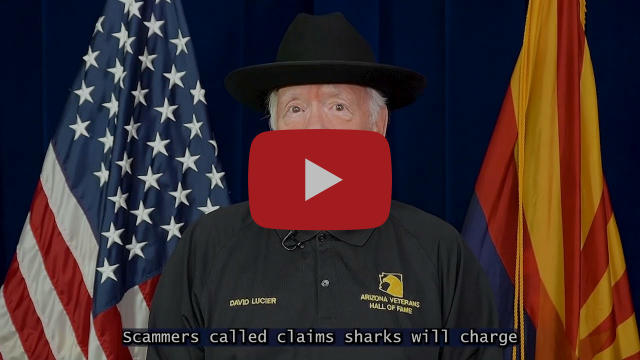Attorney General Mayes Releases PSAs with Arizona Vietnam War Veterans to Protect Veterans from Common Scams

PHOENIX –This Veterans Day, Attorney General Kris Mayes is releasing a series of PSA videos featuring Arizona veterans to share tips and best practices to fellow former service members to protect themselves and their family members from the many scammers targeting veterans and their families. Arizona Vietnam War veterans Tom McCannat, David Lucier, and Frank Moreno join the Attorney General in the PSAs
“This Veterans Day, I am proud to be working with Arizona veterans to help protect former service members from fraud and scammers,” said Attorney General Mayes. “Many people don’t realize that veterans are especially vulnerable to becoming victims of scams. I’m glad my office can help get the word out to protect Arizona’s many veterans from losing their hard-earned benefits or life savings.”
Veterans are disproportionately targeted by scammers, as mentioned in the PSAs:
- Nearly nine in 10 servicemembers and veterans have been targeted by a military service-related scam in just the past twelve months, according to the AARP
- In the past five years, Federal Trade Commission (FTC) data shows scammers have taken a whopping $1.4 billion from our veterans.
- Active-duty service members, National Guard personnel, veterans, and their families lost nearly 25 percent more money to scammers in 2024 than the year before, with reported losses totaling $584 million.
- Veterans are losing their hard-earned savings to criminals. According to the FTC veterans lose a median of $700 per person when they are victims of fraud — well above the $497 median reported across all FTC complaints.
- FTC data shows, in a typical week, military/veterans are 9% more likely than civilians to get 10 or more robocalls, and 10% more likely to get suspicious-looking texts or instant messages
The PSAs highlight common scams veterans should be aware of:
- Scammers know veterans remain true to the men and women who serve. They will make up fake “veteran” charities or use a name that closely resembles a real charity.
- Scammers called claim sharks will try to charge a fee to assist you in filing for your VA benefits. They might try to charge illegal or exorbitant fees in violation of federal law.
- VA representatives will not ask for personal data by phone, text or email. If you receive an unsolicited call or text from the VA requesting personal information, it’s a scam.
- Fraudsters may offer a one-time payment for disability or pension benefits, but the payment is usually far less than the value of the benefits.
- Fraudsters may try to charge for services from the VA that are actually free, like updating the DD form 214.
- Scammers are trying a new scheme where they pretend to be the VA and claim you have received an overpayment of your benefits. They are lying.
In the PSAs, Attorney General Mayes shares the following tips for veterans to protect themselves:
- Hang up, or delete messages, from any numbers you don’t know
- Be cautious of telephone numbers and text messages even with caller ID. Scammers can change the telephone number (called “spoofing”) to make a call appear to come from a different person or place, including the VA.
- Always apply for benefits directly through the VA. Be cautious of any unsolicited outreach about your benefits
- Don’t pay for copies of your military records. You can get them for free through the VA.
- Use VA-accredited representatives to help you with any benefits issues. The VA maintains a searchable database of attorneys, claims agents and veterans service organizations (VSOs).
“Arizona’s veterans protected us,” said Attorney General. “Now, we need to work together to protect them.”
If you believe you have been the victim of consumer fraud, you can file a consumer complaint by visiting www.azag.gov/consumer. If you need a complaint form sent to you, contact the Attorney General’s Office in Phoenix at (602) 542-5763, in Tucson at (520) 628-6648, or outside the Phoenix and Tucson metro areas at (800) 352-8431.
Report your scam to the FTC. Scams can also be reported to the Better Business Bureaus' Scam Tracker.


